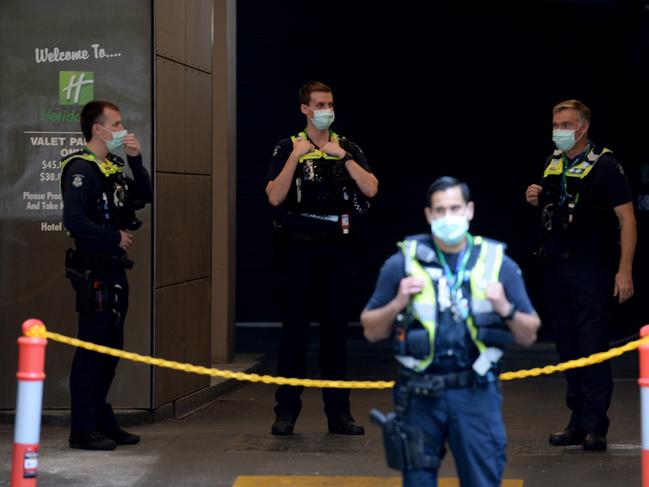Victorian authorities consider robots as option to guard quarantine hotels
Robots could soon be patrolling the floors of Victoria’s quarantine hotels, with officials considering the hi-tech feature as an option for extra surveillance.
The same robots that guarded hotel quarantine in the United States during last year’s US Open tennis championships could be used as surveillance in Victoria’s system.
COVID-19 Quarantine Victoria (CQV) authorities are considering the hi-tech surveillance as another CCTV option and have approached Australian security company Monjon to use the robots in a “trial”.
Monjon chief executive Bryan Goudsblom said the robots stood at about 158cm, had 60 different senses, 360 degree cameras and heat and temperature sensing features.
“Everything that a police officer could do on a hotel quarantine floor the robot could take that duty away,” he said.
“It would provide a barrier between human activity – a contactless communication tool to deliver hotel quarantine.”

Mr Goudsblom said state officials had approached his company with the prospect of using the robots in a trial in the state’s hotel quarantine scheme.
He said the same robots were used to guard tennis players in quarantine hotels across New York during last year’s US Open tournament.
“It’s actually been tested before and it works in a hotel quarantine bubble setting,” Mr Goudsblom said.
“The key functions there were to ID and make sure administrative staff and players had their badges on – if not security were notified. Checking PPE was the other function.”

Mr Goudsblom said the robots would roam floors, checking doors to hotel rooms were shut, ID people coming out from an elevator via facial recognition and notify security if guests sounded like they needed help through noise level sensing.
CQV confirmed it was considering the robots as an option into expanded surveillance across its quarantine hotels but would trial them first.
“We are currently considering options to install additional CCTV cameras at quarantine hotels to strengthen the present coverage,” a spokesperson said.
“CCTV is an important tool for checking resident compliance and wellbeing, but it will not replace the role currently provided by CQV residential support officers in monitoring floors.
“We are always looking at ways to improve and strengthen the quarantine program, including exploring how new technology can play a role within the quarantine system.”
The robots, which were used for about 3.5 million hours across a variety of settings in the US last year, would cost about $50-55 per hour.



To join the conversation, please log in. Don't have an account? Register
Join the conversation, you are commenting as Logout